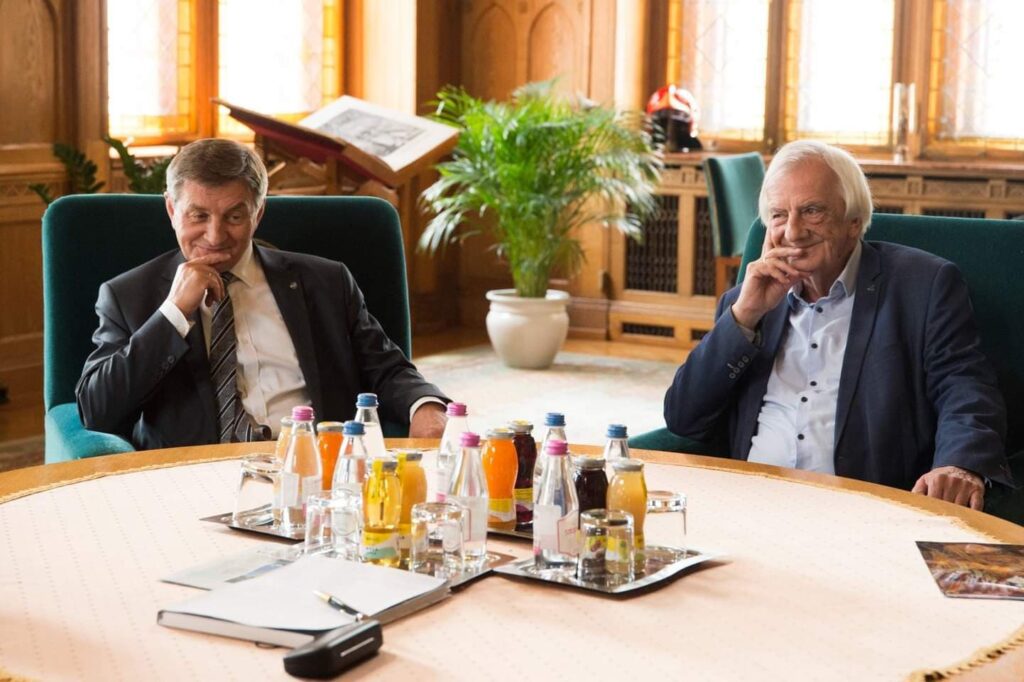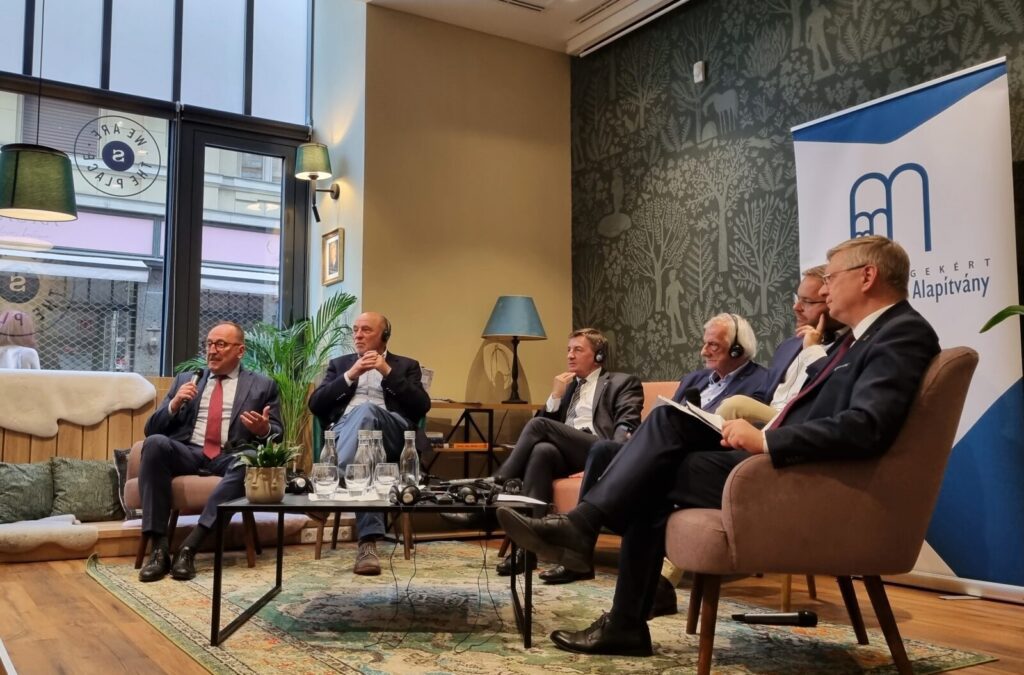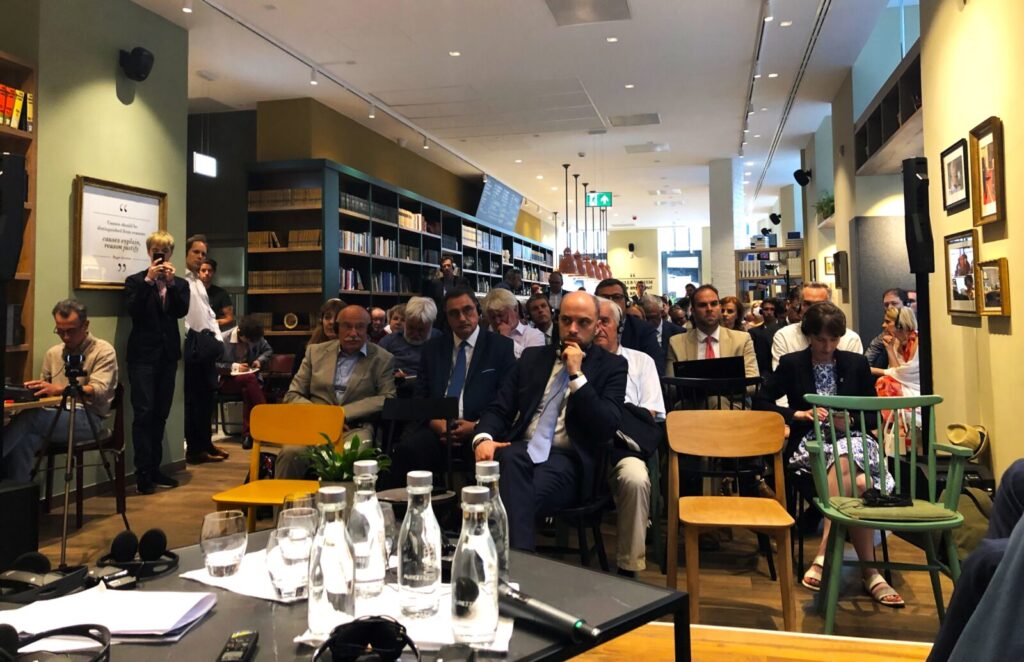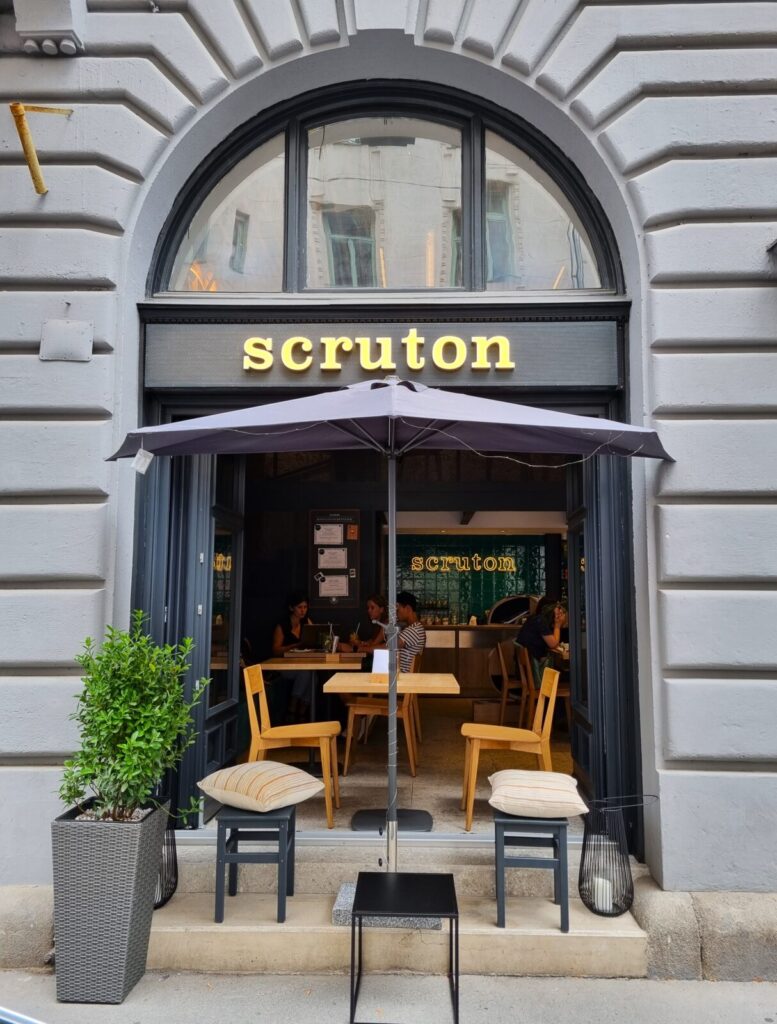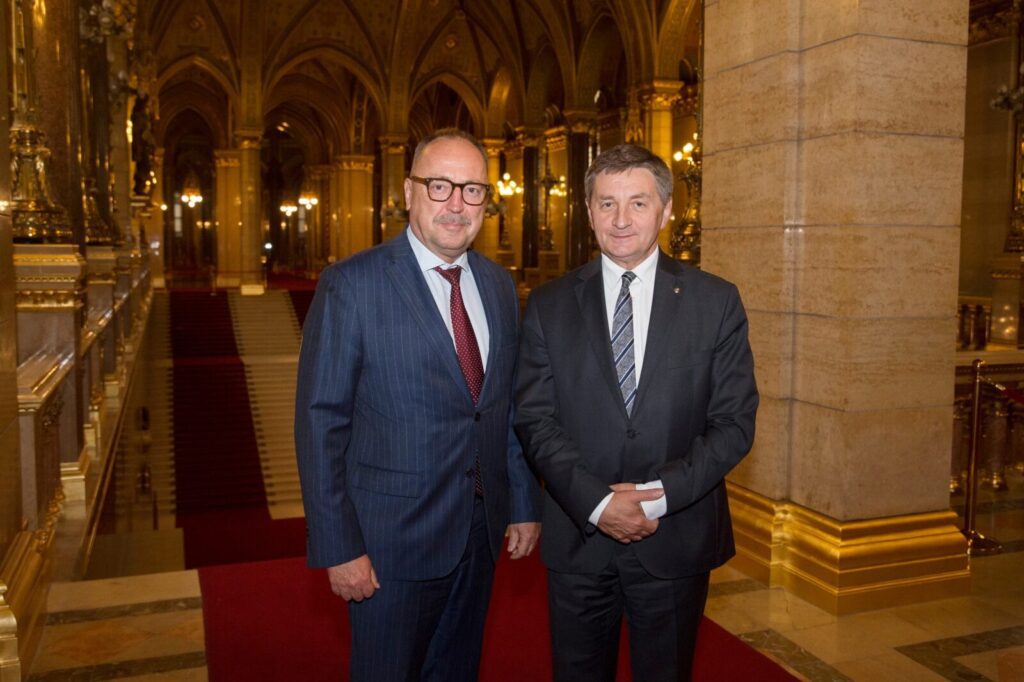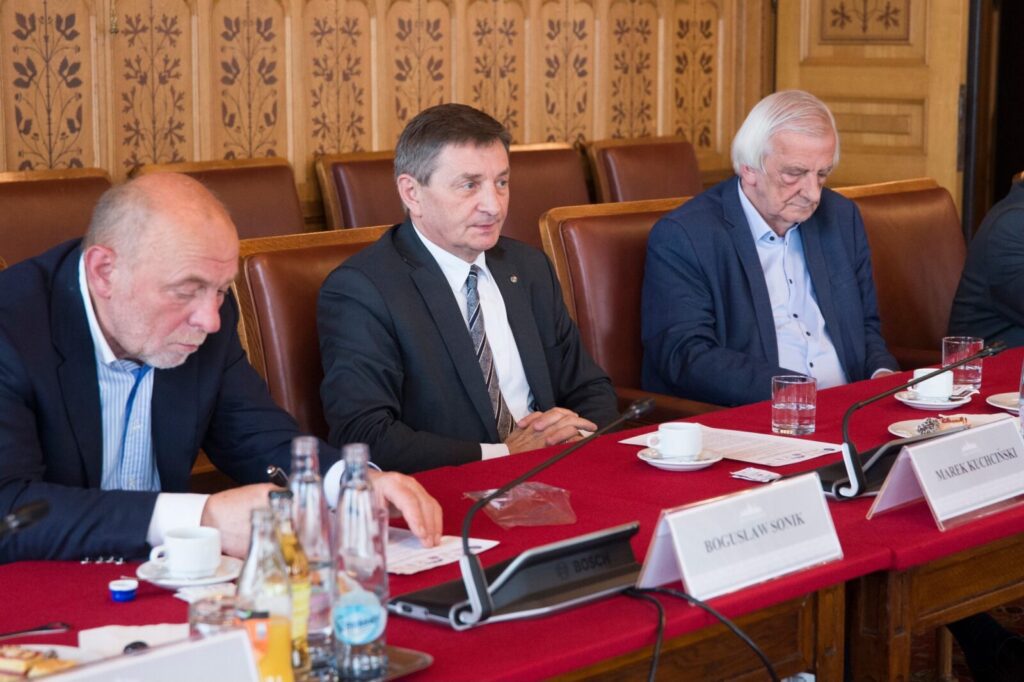On June 13, a panel discussion was held in Budapest as part of the inauguration of the Carpathian Europe Clubs on Polish-Hungarian relations and the war in Ukraine.
It was attended, among others, by Ryszard Terlecki - Speaker of the Sejm
Marek Kuchciński, Chairman of the Foreign Affairs Committee
Bogusław Sonik, member of Polish Parliament
Zsolt Németh, Chairman of the Foreign Affairs Committee of the Hungarian National Assembly
Balázs Orbán, Deputy Minister in the Office of the Prime Minister of Hungary
and guests - oppositionists of the communist system.
The discussion was moderated by the Director of the Wacław Felczak Institute, Professor Maciej Szymanowski.
Meeting place: the Scruton Café.
The first to speak was Balazs Orban. He was asked to introduce the figure of Roger Scruton, a conservative philosopher and writer, and explain what a coffee house actually is - a well-known place for meetings and discussions. The second speaker was Zsolt Németh, who in his introduction referred to Professor Ryszard Terlecki's book "Solidarity 1980-1989. The Polish Way to Freedom", which was recently published in Hungary. Then he informed about the plans of creating Scruton's café in Poland, e.g. in Warsaw or in Przemysl. In the next part, referring to the topic of the panel, he said that recently the Polish-Hungarian friendship has been put to the test. The breakthrough was the visit of the newly elected President of Hungary to Poland and the arrival of the Polish delegation is a response to it.
He expressed his conviction that in terms of goals Hungary's and Poland's position is the same, but differs in terms of the means and the way of achieving them. He declared Hungary's full support for Ukraine's accession to the European Union, presented his vision of a conservative Europe - a Europe of nations, and stated that it is unacceptable to rebuild the Soviet Union. These are common positions of both countries. However, he noted that Europe is facing an economic recession and sanctions will cost us a lot. This approach differentiates our countries and this is what we need to discuss. Then the moderator of the panel, Professor Szymanowski, took the floor again. He talked about the idea of the Carpathian Europe conference and gave a concrete example: the postulate to build the Via Carpatia road was formulated during one of the conferences and today we can already enjoy the first effects - the partially already built and under construction express road.
Marek Kuchcinski spoke next, explaining the idea behind the Carpathian Europe Clubs. It is about discussing our values, ideas, conservatism or Roger Scruton's vision. Today's challenges require such common discussions and that is why Clubs of Carpathian Europe were inaugurated. He also announced the institutionalization of the Carpathian Europe. He referred to the fact that by joining the EU we rejected barriers and borders, e.g. we can travel freely, but some barriers remain. The war in Ukraine is one such barrier, that is - a new challenge. He stressed that strengthening Polish-Hungarian relations is our future, but it requires discussion and he expressed his satisfaction that it is happening now and in such an unusual place.
The next speaker was Deputy Speaker of the Sejm Ryszard Terlecki, who began by saying that the war took us by surprise, both its outbreak and the heroic resistance of the Ukrainians
and the helplessness of the rest of the world. In the first days we were afraid of a global conflict, but we overcame our fear and started to help Ukraine in real terms. For Poland it is obvious that we must help our neighbor, which should defend its sovereignty and at the same time weaken Russia. However, Terlecki expressed concern that the positions of various countries were divided. Poland, among others, was surprised that Hungary perceives the situation differently, but we are able to understand this in the economic and political context. He also expressed concern that the visit of Polish parliamentarians could be used as propaganda for the opposition, which could accuse our government of being pro-Putin by acting in this way. They can accuse our government of being pro-Putin by acting in this way. He links this to the fact that elections are approaching in Poland, and this can be an argument in the campaign. In Hungary the situation is completely different, because elections have already been held there. Bogusław Sonik spoke next and said that the problems we faced concerned free countries. The new problem is different - Ukraine is fighting for its freedom as well as ours. Supporting Ukraine has a huge price, but freedom and independence is priceless. Therefore, Hungary cannot be guided only by its own interests, nor can it fear criticism from others, because not only Hungary is criticized, but for example France with Emanuel Macron and Germany with Olaf Scholz. Finally, he added that Hungary's failure to support Ukraine was perceived by Poland as a lack of empathy.
Balazs Orban was the next to speak for the second time, presenting Hungary's point of view that anyone can be their enemy or their friend, yet Hungary must strengthen itself. However, he believes that war is a great tragedy and a threat to them. He compared the war to a movie that we all watch but interpret differently. Both Hungary and Poland have condemned Russia, supported Ukraine, and behaved humanely. But Europe needs to show more unity. He allows military support for Ukraine, but economic sanctions must be recalculated. As an example, he pointed to the 2014 sanctions imposed on Russia after the annexation of Crimea, which had no effect but heavy losses for Hungary, and yet 8 years later Russia attacked again. According to him, the logic of Hungarians is based on peace. It does not matter who wins, it is important to restore peace, because it is in Hungary's interest.
Zsolt Németh, in turn, stressed that sanctions are very important, but he agrees that they must be recalculated. He stated that we are dealing with a propagandistic war, and differences cannot spoil the very good Polish-Hungarian relations, which have been developed for a thousand years, emphasizing their strength. He stressed that he is very much afraid of economic recession, which can have tragic consequences, therefore he asks for understanding of the other side. He expresses his gratitude to Marek Kuchciński, because when writing about it in Polish media, he stresses that we cannot say that we differ, but only try to understand it and Marek Kuchciński understands that. He believes that regardless of military support, diplomacy is needed. Russia will still be a part of the world and we have to act in such a way that it will still be a part of the world, but will not pose a threat in the future.
Marek Kuchciński, thanking Zsolt Nemeth for writing an article in the Polish media, as it explains the Hungarian position and encourages discussion. Once again, he expresses his satisfaction that we can discuss such serious and interesting topics during this panel. Free with free, equal with equal. This is how we have to build Europe, because when we had this motto, our neighbors did not pose a threat to us. That is how he would see the European Union - as a Europe of the Fatherlands, not as a submission to the idea of a European superstate. This is what unites us and we need to understand it. The Speaker stated that thinking that Ukraine should give up part of its territory is anachronistic. According to him, the principle of inviolability of borders is unquestionable. A new nation is being formed in Ukraine, if the Russian-speaking citizens stand up against the Russian-speaking aggressor, we respect it and that is why we support Ukraine so much.
Ryszard Terlecki spoke next, mentioning that for many years it was promised that Ukraine would be admitted to the European Union. The situation is similar with Montenegro or Macedonia, which, despite the fact that they meet the conditions and belong to NATO, are still not members. As a result of the war, the situation has changed, Ukraine and all the other countries are facing the opportunity to join the Union, because the old Union has understood the essence of the problem. Huge geopolitical changes are taking place right in front of our eyes. Central Europe must finally get along. The reduction of coal and atom in energy production has been planned in the Union for a very long time, sanctions in the Union also lead to this. Despite the differences, we must be strong, we must be together and convince others of this. In the end, the panel moderator, Professor Maciej Szymanowski, took the floor and expressed his satisfaction with the fact that just such a discussion, very serious and concrete, was inaugurated by the Carpathian Europe Clubs in Budapest.
